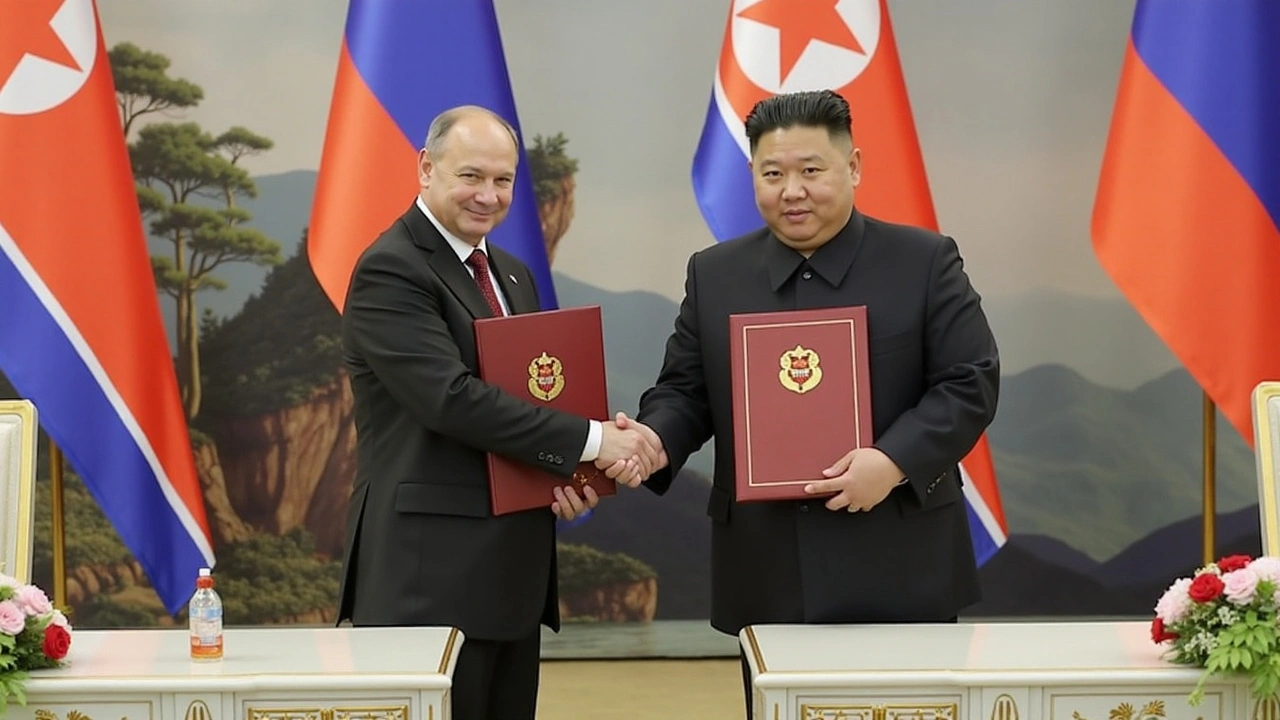North Korea’s Deployment of Troops to Support Russia in Ukraine Raises Global Alarms
19 Oct, 2024North Korea's Unexpected Leap into the Ukraine Conflict
In a surprising twist to the relentless conflict in Ukraine, South Korea's National Intelligence Service has determined that North Korea is becoming directly involved by sending a sizable troop contingent, including specialized forces, to assist Russia. This potent military maneuver introduces a complex layer of geopolitics, escalating tensions not only within the region but also prompting reactions on a global scale. The contingent, totaling approximately 12,000 soldiers, is poised to shift the dynamics of the conflict significantly.
According to corroborated intelligence reports from October 18, 2024, North Korea's involvement in the Ukraine war marks a severe escalation in their international engagement. The troops are projected to be combat operational within the disputed regions as soon as November. This step, orchestrated in Pyongyang, showcases their willingness to support allies militarily, breaching their usual diplomatic boundaries.
International Community Reacts to North Korea-Russia Alliance
Reacting swiftly to this unnerving news, Ukrainian President Volodymyr Zelensky voiced his grave concern. He highlighted that intelligence had unveiled preparations for an initial deployment of 10,000 North Korean soldiers to augment Russian military operations in Ukraine. Zelensky called for a decisive, unified effort from Ukraine's allies to counter any furtherance of military cooperation between North Korea and Russia, emphasizing the potential threats to global peace and security.
American stakeholders, too, have been stirred by these developments. US Congressman Mike Turner, who chairs the influential House Intelligence Committee, called on President Joe Biden to delineate clear boundaries, suggesting that the involvement of North Korean troops should be regarded as a crucial red line for both the United States and NATO. His criticism was notably sharp, questioning the administration for not briefing Congress sooner, thus sparking debates over intelligence transparency and foreign intervention policies.
Kremlin's Denial Amid Rising Concerns
The Kremlin's response to these allegations was swift and dismissive. Russian officials have consistently downplayed the reports, denouncing them as inaccurate fabrications, labeled generically as “fake news”. This dismissal, however, does little to alleviate international apprehension, particularly given the intricate web of global alliances and the unpredictable nature of North Korea’s international strategies.
NATO’s Secretary-General, while acknowledging the uncertainty, expressed concerns about North Korea's growing support through arms and military supplies, although evidence of direct troop engagement remains circumspect. His remarks have not dispelled the shade of doubt enveloping this situation, given the history of clandestine support networks shaping conflicts globally.
The Confirmed Movement of Troops Escalates Tensions
Concrete reports from the South Korean intelligence agency confirmed that an initial batch of 1,500 special operations soldiers had already been shipped from North Korea to Vladivostok, Russia by North Korean naval assets earlier in October. This vital piece of intelligence affords a glimpse into the operational realities of North Korea’s involvement, and raises credible concerns about further installments of troops.
The implications of this deployment pose severe security risks beyond the Korean Peninsula, feeding an environment ripe with mistrust and strategic recalibrations. The burgeoning ties between Pyongyang and Moscow send a clear signal of intensifying military collaboration, creating a potentially volatile scenario that could disrupt regional stability and inflame existing geopolitical tensions.
Global Geopolitical Ramifications
The increasing collaboration between North Korea and Russia has wide-reaching consequences. It represents not merely a military alliance, but a potential catalyst that could invite further international involvement or retaliation. This strategic cooperation may convey to the rest of the world that North Korea is ready to shed its cautious mantle, and instead, pursue a more aggressive geopolitical portfolio.
As newly-formed alliances consolidate and the Ucrainian conflict continues to unravel, global leaders are tasked with responding in a way that ensures stability while safeguarding international peace. This ought to prompt a reevaluation of current diplomatic strategies and highlight the urgent need for concerted action. The stakes are indeed high, with the international community awaiting further developments that may either see a resolution or throw deeper complexities into an already convoluted global stage.

 by
by